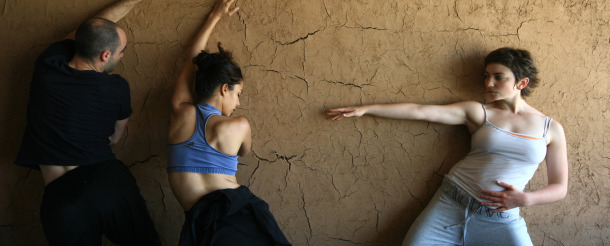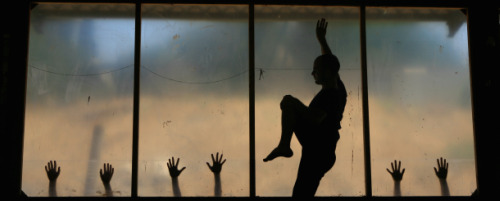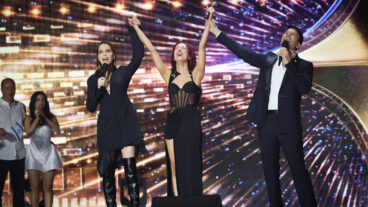A Jerusalem dance company splits in two and reinvents itself as an ecological art village inspired by dance and a dance group inspired by ecology.

In most places it’s a 1958 Hitchcock movie, or a word to describe a dizzy sort of feeling, but in Israel, Vertigo is a world-renowned dance troupe that was founded in Jerusalem about 18 years ago and now tours the planet.
Not to be over-shadowed or outdone by the Batsheva Dance Company in Tel Aviv run by Ohad Naharin, Vertigo has decided to give itself a new dimension. The modern dance company has taken a few steps back and in addition to its base in Jerusalem has also made a home in among abandoned chicken coops. It has gone ‘eco’ (possibly ‘loco’ some might argue) on a 60-year-old kibbutz, Netiv HaLamed Hey in the Ella Valley, smack dab between Jerusalem and Tel Aviv.
They call it the Vertigo Eco Arts Village and it host workshops, many dance-related, some not, to educate and bring together like-minded people. The workshops are about building with mud bricks; renewable energy; and art and dance in the ecological landscape and mindset.
The core founders and families of Vertigo live on the kibbutz (‘The Tribe’ numbers about 12 people) where they build earth-friendly homes and are busy with earth-loving activities. Thousands of people come to their renovated coops for the dance workshops and activities and both the city troupe and the country troupe rehearse in the coop-turned-studio.

Mountains, wine and giants
Looking out on one of the most tranquil vistas in all of Israel, the Ella Valley is also home to some of the country’s best wineries, and most importantly for religious folks it is the spot where the biblical David is said to have taken aim with his slingshot and struck the towering Goliath in the middle of his forehead.
“I can see Tel Sochar with my own eyes right now, and Tel Azeka the Philistine camp,” Vertigo co-founder Adi Sha’al tells ISRAEL21c, referring to the location of the biblical fight in the valley.
The idea for an eco-location grew out of a feeling that Sha’al and his wife Noa Wertheim, Vertigo’s other co-founder experienced, when they were living their dreams in their Jerusalem studio by day and returning to their urban home in the evening to be with their kids. They say they felt disjointed and off-balance.
“We just figured out that it doesn’t work for us,” says Sha’al. “We chose to be artists and our kids were growing up with no connection to what they were eating, without the right education. We decided, ‘Let’s live fully. Let’s make [ecological thinking] a way of life.’ “
With Noa’s three sisters and their families, Sha’al, Noa and Vertigo set off to create a new paradigm. About three years ago they approached the kibbutz and started planning their move.
Collecting the tribe
“We are a bunch of artistic and ecological people looking for our tribe and togetherness,” says Sha’al, of the intersection between his extended dance troupe and family from Vertigo and the kibbutz, which is now in a process of privatization. “We are two movements going in opposite directions and there at that intersection, hopefully we’ll meet someone. The kibbutz opened up the opportunity for us to use their chicken coops no longer in use, and we opened a studio.”
Now the studio and other spaces are a hub, an intriguing meeting place for Israeli and global creative arts, says Sha’al. He brings in experts in different fields, from Judaism to green building to organic farming to movement.
Workshops and practices touch on topics like how to harvest green energy from the sun and wind, compost toilets, and water. “Water is a big issue in this country,” says Sha’al. “We are collecting rainwater and reusing it. We are building a new intentional community, from the seed of a family of four sisters with their husbands, other artists and ecologists.
“We are now 12 people, like the 12 tribes of Israel,” Sha’al points out to ISRAEL21c. He identifies his approach to Judaism as pluralistic, citing a Shavuot holiday workshop that featured independent dancers and the dance portal Bodyways run by Rivi Nissim, as an opportunity for Israelis to enjoy tikkum leil Shavuot – an all-night praying and studying experience on the Jewish holiday of Shavuot when he hopes to connect the spirit to the body.
Recently, Noa informed a more global audience about this important connection at a TEDx (independently-organized ‘Ideas Worth Spreading’) talk in Tel Aviv. She talked and danced, while exploring the connection of man to his environment. “Noa was invited there to talk, and through dancing she showed how people can walk their talk – that’s what we do in Vertigo and how we make a change,” Sha’al concludes.












